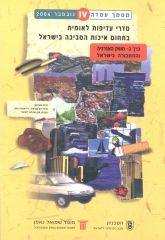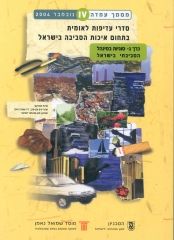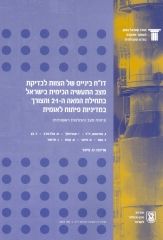Modern Jewish Identities and the State of Israel
Is it possible to produce a significant attitude, in which the multiplicity of identities in the State of Israel will be productive and fertile, rather than one that necessarily fosters tension and destructive inner conflict within the state? This question stands at the heart of this article, which argues that the State of Israel is […]
Report PRIME ENIP Project Indices Data Scienc Technology Israel
This report was published as part of the project “European Network for Indicator Producers, PRIME-ENIP”. Its purpose is to establish a network of indicator producers in the fields of science and technology, based on the experience of recognized institutions, laboratories, research groups and indicator producers, in order to develop the ability and knowledge of providing […]
Science and Technology in the Israeli Consciousness
We present the main results and conclusions of a public opinion survey concerning the attitudes of the Israeli public towards various aspects of science and technology (S&T) in Israeli society. The survey was done in January and is based on telephone interviews with a random sample of about 490 adults (18+) representing the entire Israeli […]
Major Plan for Higher Education – Planning Versus Performance
The higher education system in Israel was based, from the beginning, on academic research in Humboldtian model of teaching and research combined with a strong emphasis on research. Over the years different subjects were added and the requirement to combine in academic studying also professional training increased. Up to a certain stage the Universities succeeded […]
Instruments for Open Space Preservation: What Can Israel learn from other countries?
Conservation of open space is a difficult goal to achieve in a densely inhabited country such as Israel. Despite the efforts of Israel’s statutory planning bodies and the availability “on paper” of a plethora of planning and legal tools, development pressures often win out. More innovative tools, or a repackaging of tools, are therefore necessary. […]
National Environmental Priorities of Israel, Position Paper IV, Vol. 2: The Energy Market in Israel

The second volume of the 2004 position paper is dedicated to the energy market in Israel and the importance of establishing a sustainable energy market. Energy production and consumption creates environmental problems such as air pollution, resources depletion, as well as soil and water contamination. Chapter 1 of this volume was written by Prof. (Em.) […]
National Environmental Priorities of Israel, Position Paper IV, Vol. 3: Environmental Management

The third part of the 2004 position paper brings two important issues into focus: The first part suggests a procedure to Environmental Consensus Building, as a means to bridge environmental conflicts. The second part deals with the environmental obligation of regional councils in Israel as the final frontier to protect open spaces and agricultural farmland. […]
Interim Report of the Investigatory Team on the State of the Chemical Industry in Israel at the Beginning of the 21st Century

The aim of this work is to survey the state of the chemical industry in Israel today and the alternatives for its future development and to recommend formulation of a national policy in this field. This work complements and updates the chemical industry survey conducted and distributed by the Samuel Neaman Institute in 1995, by […]
National Priorities for the Environment in Israel – Position Paper III

The third National Environmental Priorities reflects the input of many professionals. In the previous Position Papers, an overview was presented covering the main areas of environmental concern, followed by professional recommendations regarding appropriate priorities. Both documents were widely distributed and attracted a large number of participants at professional conferences that coincided with their release. This […]
ארץ ישראל מבפנים ומבחוץ

The personal story of Samuel (Sam) Neaman presented in this book began in the 20’s of the previous century (the twentieth) in Tel Aviv which was then changing from a suburb of Jaffa to a little town. It spans over three decades in Eretz Yisrael, France, Syria, the fronts of the Second World War, England, […]
